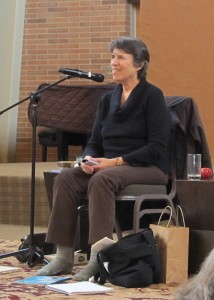Studying the Writer’s Mind
by Allyson Latta
This essay was first published in the newsletter of the Writers’ Community of Durham Region, December 2010. It is reprinted here with the permission of WCDR.
Details of Natalie sightings were reported with breathless enthusiasm. “I met her walking in the woods!” said a woman across from me at dinner before the first workshop. “We talked! She was collecting acorns!”
The sycophantism was rampant, and no surprise. Natalie Golberg is one of North America’s best known writing instructors. Her seminal Writing Down the Bones, which celebrates its 25th anniversary in 2011, has been translated into 14 languages and sold more than a million copies. I received mine from a friend while living in Japan in the early 1990s and to this day I can remember some of the advice and exercises.
Later that evening we filtered into the Main Hall—with its buttressed, arched ceiling and multi-paned windows set so high they framed only sky—for the first of four workshops based on Natalie’s book on writing memoir, Old Friend from Far Away. Seated up front, she was as I’d imagined her: dressed in black shirt and pants, with short, dark hair, a big smile, her Brooklyn accent still untamed after years in New Mexico. Draped on the back of her chair was a purple shawl. A small table on each side was a clutter of water bottles, papers, books. It was as if she’d been teleported there from her family room. She even stopped, once, to apply lip balm.
Despite this informality, she made it clear she was going to work us.
“We’re here to crack open structure. That’s where the energy is,” she pronounced. She was talking, as she usually is, about life as well as writing. The first thing she had us do was break out of our orderly rows of seats and move closer to her, arranging ourselves randomly, some in chairs, some on the floor.
 So there I was, on a BackJack meditation chair—a floor cushion with back support—legs outstretched, barefoot no less (shoes left at the door). I was 700 kilometres from home, at Kripalu Center for Yoga and Health in the Berkshire Hills of Massachusetts. On the shuttle from Albany airport, I had chatted with a fresh-faced yoga instructor from South Carolina, named Sunshine. In the corridor on the way to my room I’d passed a guy doing a head-stand. At dinner, I had congratulated myself on sampling earthy vegetarian medleys but stopped short of adding a dash of something called Bragg Liquid Aminos. I’d never in my life attempted yoga, and I suck at meditation.
So there I was, on a BackJack meditation chair—a floor cushion with back support—legs outstretched, barefoot no less (shoes left at the door). I was 700 kilometres from home, at Kripalu Center for Yoga and Health in the Berkshire Hills of Massachusetts. On the shuttle from Albany airport, I had chatted with a fresh-faced yoga instructor from South Carolina, named Sunshine. In the corridor on the way to my room I’d passed a guy doing a head-stand. At dinner, I had congratulated myself on sampling earthy vegetarian medleys but stopped short of adding a dash of something called Bragg Liquid Aminos. I’d never in my life attempted yoga, and I suck at meditation.
Listen, I was cracking open structure just by being there.
Initially there were murmurs of surprise about the group size—148 of us. “Oh, don’t worry—we’ll get intimate,” said Natalie, her promise vaguely ominous.
We began each session with a 10-minute meditation. And then, we wrote.
Natalie would suggest a topic. “Go. Ten minutes,” she’d say. (That instruction is her trademark.) During workshops I wrote surrounded by the scritch-scratch of 147 other pens on paper; homework I did alone in my room or with a group of new friends in the coffee shop. That mid-November was one of endless sunshine and spring-like temperatures, so I even wrote on the terrace—the trees shedding late-autumn leaves, the expansive lawn sloping down to Lake Mahkeenac, the hills in the distance—or perched on the life guard’s chair at the beach.
I wrote and wrote until my hand felt disembodied.
The core of Natalie’s teaching has remained the same since Bones: writing practice. Keep your pen moving for a set length of time, and write whatever comes to mind, not trying to control the result, not worrying about punctuation, resisting the itch to cross out. It doesn’t matter where you begin. What I see in front of me. Mashed potatoes. Scars. You just need “a place to push off from.”
“And go for the jugular,” she advised. If something scares you, write about it.
Then she blindsided us. We were told we had to read aloud, in groups of three, these pieces torn from our hearts. Don’t judge another’s writing, she instructed. Don’t comment. Instead, listen, “study the writer’s mind.” This was difficult at first, especially when a piece was powerful. But soon we came to see it as liberating.
Some volunteers read to the whole group, and often there were tears, in readers and listeners. Well, Natalie had after all promised intimacy. Again we weren’t to comment. “Writing is ninety percent listening,” she said. Instead we’d practise “recall,” simply repeating aloud phrases from the reading that stayed with us.
 We studied Natalie’s mind too, as she spoke and when she read from her memoir Long Quiet Highway. She is by turns Zen-like (“You’re here to write because you want to enter your life, not get away from it”) and down-to-earth (“Nobody else gives a shit whether you write or not”). “Take a walk in the orchard,” she told us on our second day. “Don’t write about it. Just go. It’s beautiful.” I did, at dawn when the grass was still crisp and frost-tipped and the air scented with fallen apples and the sun spilling orange over the hills. She was right.
We studied Natalie’s mind too, as she spoke and when she read from her memoir Long Quiet Highway. She is by turns Zen-like (“You’re here to write because you want to enter your life, not get away from it”) and down-to-earth (“Nobody else gives a shit whether you write or not”). “Take a walk in the orchard,” she told us on our second day. “Don’t write about it. Just go. It’s beautiful.” I did, at dawn when the grass was still crisp and frost-tipped and the air scented with fallen apples and the sun spilling orange over the hills. She was right.
We also studied, through their work, the minds of poet Allen Ginsberg, novelist Saul Bellow, memoirist Paul Zweig, and several songwriters, including Bob Dylan.
Over three days Natalie said little about memoir. But then, she didn’t have to. All good writing bubbles from the same spring of experience and reflection. My take, not hers, though I believe she’d agree.
Natalie Goldberg is a gift to us not because she teaches us how to write, but because her love of language makes us feel we can, and should. She encourages the writer in each of us to listen, to others and to the self. The rest, well, that comes with practice.
Asked in the final workshop whether she had a meditation she’d recommend for writers, Natalie sighed. “Oh, honey, there’s no magic. Just pick up a pen.”
Go. Ten minutes.


Good for you Allyson, taking off your instructor hat. Natalie Goldberg sounds like an interesting woman. You came away enriched.
Allison, you may have forgotten you wrote this, so long ago – but I loved reading
your account of time with Natalie. Read it on a rainy dreamy day, chilling out
catching up with my fave Zen mind. Best regards and happy writing, Leslie.